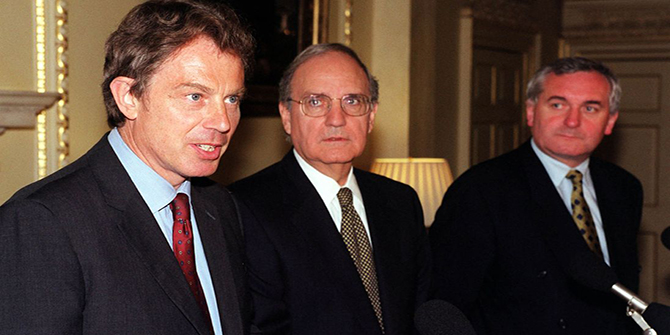 Giada Lagana offers on overview of the EU’s role in Northern Ireland’s peace-making process over the past three decades, and assesses its impact on Anglo-Irish relations. She concludes that protecting the Good Friday Agreement and the dynamics between its key actors is vital to Northern Ireland’s future, and there is hardly an alternative on offer.
Giada Lagana offers on overview of the EU’s role in Northern Ireland’s peace-making process over the past three decades, and assesses its impact on Anglo-Irish relations. She concludes that protecting the Good Friday Agreement and the dynamics between its key actors is vital to Northern Ireland’s future, and there is hardly an alternative on offer.
April 1998 was a time of great hope and optimism for Northern Ireland. The signing of the Good Friday Agreement marked the start of a 20-year period of relative peace and positive economic, social, and political gain for the UK’s most troubled region. But 20 years on, Northern Ireland faces troubling challenges: the collapse of the power-sharing devolved institutions; the current political impasse and breakdown of trust; the looming challenge of Brexit; and the damage these inflict on British-Irish relations. All these instances pose very real dangers for Northern Ireland’s stability and future. Brexit intersects with the political and economic sphere and puts serious pressure on Northern Ireland’s hard-won constitutional settlement, which is highly dependant on positive Anglo-Irish relations.
The stability of the Good Friday Agreement has always been rooted in British-Irish cooperation, with EU support. Since 2007, while devolution has been institutionally continuous and the level of violence has subsided, events have demonstrated that many issues relating to the peace process remain unresolved. This was the case, for example, with the 2012-2013 rioting following changes governing the flying of the Union Flag on Belfast City Hall, or the 2015 Fresh Start Agreement on paramilitarism. In each of these mini crises, the Northern Irish parties looked to the British and Irish governments to mediate and intervene. At the same time, the EU was part of the framework within which the Good Friday Agreement was signed. Accommodating Nationalist identity allowed for the expression of a common Irish identity within a broader shared European context.
Yet too little has been said about the origins of EU influence in the 1980s. This was a time when extensive dialogue and lobbying was taking place within EU institutions – especially within the European Parliament – and had the objective of fostering a European dimension to conflict amelioration in Northern Ireland. From 1984 and the publication of the European Parliament’s Haagerup Report, the European Community started to assess its engagement in the routine public policy-making of the region in a determined manner. Adaptations also took place in ideas about identity and territory.
The British government then accepted the Haagerup Report’s conclusions, along with reflections on what sovereignty meant in an interdependent world. The whole experience contributed to the foundations of the 1985 Anglo-Irish Agreement and to subsequent ‘constitutional moments’ in the history of the peace process. It contributed to the transformation of the region from a site of conflict to a site of peacebuilding, and that policy remit was essential in demonstrating to British and Irish elites, as well as local authorities, how they might gain greater control over their relationships within the island of Ireland and with the EU. Such control was ultimately filtered through a range of new regional institutions and the development of relationships and networks initiated by the Anglo-Irish Agreement.
The role of the EU in facilitating more positive Anglo-Irish relations evolved from enabling dialogue and intergovernmental agreement to encouraging necessary local reform in administrative practices vis-à-vis the EU. Firstly, the EU has helped, mainly through the European Parliament, to nudge elite actors to negotiations, by providing both a context and a rationale for cross-border, intergovernmental discussion and compromise. The UK’s membership of the EU broadened the context within which possible resolutions to the conflict might be framed and implemented.
The origins of the EU’s ‘intervention’ in Northern Ireland lie in the direct actions of political actors working within or around Brussels. Fianna Fáil and Independent Fianna Fáil MEPs and the SDLP’s John Hume used their position as newly elected MEPs to campaign for the then European Economic Community to take a stance in relation to the conflict in Northern Ireland. These actions brought international recognition to an aspect of the conflict that the unionist community largely disputed (as seen in the collapse of the Sunningdale Agreement in 1974), but which came to be essential to the peace process as it developed from the 1985 agreement onwards.
Indeed, the Anglo-Irish Agreement demonstrated a growing recognition of the importance of a ‘European’ dimension to resolving the conflict. The Agreement noted the importance of membership of the EEC in its preamble and drew heavily on the findings, recommendations, language, and spirit of the 1984 Haagerup Report. And while British and unionist politicians had always been reluctant to present the EU as an ‘external player’ in the game of peace but it is a fact that, from the 1990s onwards, references to Europe were more plentiful and more substantive than ever before. All significant post-1985 developments (the Joint Declaration, Framework documents, and the Good Friday Agreement) acknowledged interdependence not only between the two states and on the island of Ireland, but also in their common membership of the EU. By providing an ‘enabling’ context for Northern Ireland’s development, and supporting communication between the two governments, the EU contributed to helping Northern Ireland enter into a new phase in which a long-lasting peace was eventually possible.
 Featured image credit: Sky News.
Featured image credit: Sky News.
Twenty years later, little contingency has been made for identifying the consequences of Brexit for the future of Anglo-Irish relations. Indeed, one of the striking aspects of present circumstances is the apparent absence of capacity to address the scale of what must now occur. In this context, unilateral action by one actor (the British or Irish government, the Northern Ireland parties, or the EU itself) inevitably has consequences for the overall ‘ecological balance’ and sustainability of peace on the island of Ireland.
Brexit has revealed a swathe of divisive and transformational forces that have the potential to alter Northern Ireland’s constitutional architecture. Given that the 1998 Good Friday Agreement followed a 25-year period of violent conflict, and its terms were only agreed after complex and tense negotiations, it is disconcerting how Brexit threatens key features of a hard-won peace. Protecting the Agreement and its key actors is vital to Northern Ireland’s future, and there is no ready or easy alternative.
The above draws on the author’s paper presented in the 2018 PSA conference, entitled “The Europeanization of the Northern Ireland Peace Process and the Anglo-Irish Dimension of the Northern Ireland Conflict”. This article represents the views of the author and not those of LSE Brexit, nor of the London School of Economics and Political Science. It first appeared on LSE British Politics and Policy.
Giada Lagana was awarded her PhD in Political Science and Sociology from the National University of Ireland Galway in January 2018.






